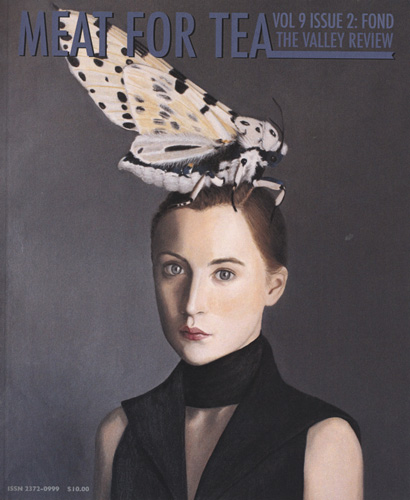Meat for Tea – 2015
Paralleling the instructions in the publication’s opening “Salutations from the Staff”—where the reader is told to gather a variety of ingredients to let simmer—the editors of Meat for Tea have compiled a diverse selection of genres and writing styles in the “Fond” issue. The unifying thread among the pieces is experimentation, either in structure or content. This issue is a collection of permissions, inviting readers to explore the new directions of contemporary creative writing. Paralleling the instructions in the publication’s opening “Salutations from the Staff”—where the reader is told to gather a variety of ingredients to let simmer—the editors of Meat for Tea have compiled a diverse selection of genres and writing styles in the “Fond” issue. The unifying thread among the pieces is experimentation, either in structure or content. This issue is a collection of permissions, inviting readers to explore the new directions of contemporary creative writing.
Connolly Ryan pushes the boundaries of narrative in poetry. In his poem “All Ducks in a Row,” the reader eavesdrops on a conversation between two ducks. Succinct lines and strangeness propel the poem forward, yet they are so compact, the piece calls for a second read:
Who is your hero?
Anyone who has never had to listen to you.
What name do you prefer, Daffy and Donald?
Like Socrates, I prefer nothing. Just call me Duckrates.
Do humans amuse you?
Only when they are trying to shoot you.
In her poem “Easter,” Lea Banks offers insight on the way children observe and reflect upon the world around them. The voice is honest, reporting facts and details about Daddy and Mama and the chicks on the farm, then tattling on the other children at the Baptist church, including her sister. Such commonplace activities lead into the next stanza, a story still carried in the same, even voice:
I sit in the pew, think of Daddy coming
home from work. A piglet rolled off
a farm truck in front of him. He picked up
the poor thing, threw it in a laundry basket
in the back seat. Elmer the pig surprised my mama
with shit and a squeal on her kitchen floor.
His home, a paint-chipped crib in the deserted lanai.
He died the next day.
Several of the short stories in this issue transport readers to the past, back to the lunch counter sit-ins of 1960 and the radio reports on the assassination of John F. Kennedy. Another story, “Talk Nonsense to Me” by Jonathan Caws-Elwitt, is set in the haze of the 1963 British film and television industry. An American scriptwriter named Tom narrates his adventures of working alongside other writers to create a comedy special. His voice is sincere, making clear statements such as, “I liked the scale of this world because it comforted me, professionally perhaps, but, above all, emotionally.” Throughout the story are excerpts from scripts and songs written for the special, drawing the reader closer to the production and humor of Tom’s writing and the frustrations of working with stubborn and arrogant actors.
J. T. Townley’s story “My Life as Mark Wahlberg” follows the absurd, yet not totally unrealistic, tale of a man mistaken for a famous actor. At first, the story seems to move toward a magical realism style because the narrator, Mike Strohberg, is the only character who notices strangers giving him second glances and whispering about him; Mike’s wife, in-laws, and friends are oblivious. As he looks at pictures of Wahlberg, Mike observes, “the longer I stare, the more I think I’m looking at my own reflection. I’m beginning to see what others must see.” Mike grows more and more famous in his little town, and the story hurdles toward a surprising, yet inevitable, ending.
Like all good satire, Michael Meyerhofer’s list of “AWP Panel Proposals Gone Wrong” guides the readers into re-seeing (and likely laughing about) the world through a humorous lens. Meyerhofer draws upon the everyday scenarios scholars face, such as crafting a CV or sharing publication achievements, to create proposal titles that strike truth about frustrations, fears, and stereotypes in academia, such as: “Oh, You Bought a House AND a Cup of Coffee?: How to Talk to Tenure-Line Colleagues Without White-Knuckled Weeping,” “Wikipedia and YouTube, a Writer’s Best Friends: How to Use Modern Creative Writing Research Tools so that the Reader Thinks You Spent Hours in a Dank Library,” and “I’m Not Homeless, I Promise: Male Creative Writing Professors and Their Facial Hair Configurations.”
Meat for Tea is a delicious read, many pieces leaving me contemplating my definitions of genre. Future readers, prepare for surprises, and prepare to re-see what’s possible in poetry, prose, and nonfiction.
[www.meatfortea.com]





